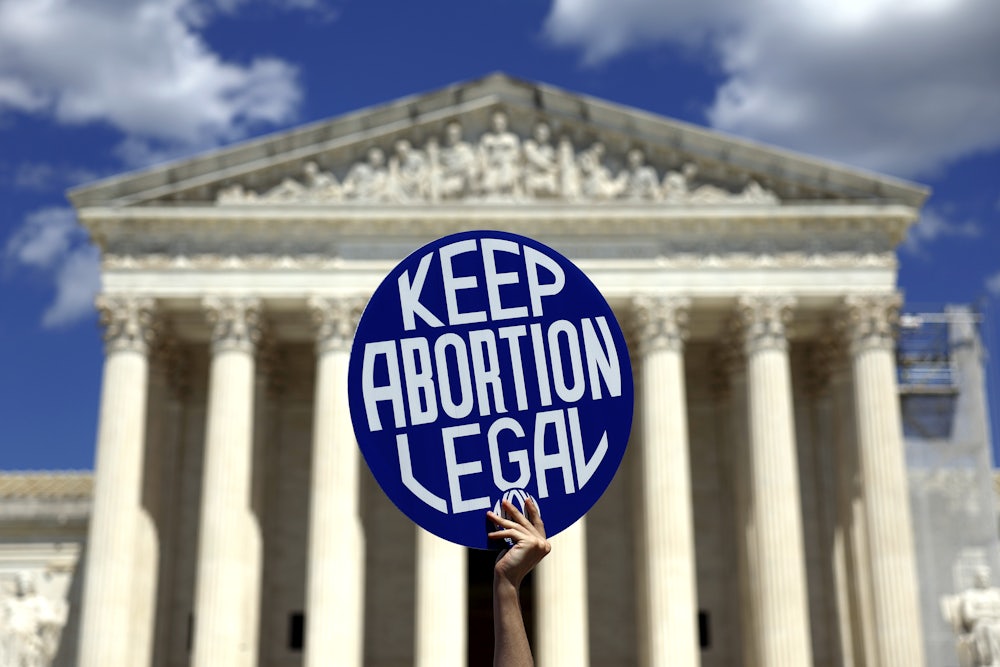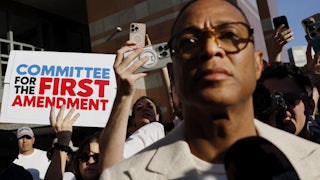Crisis pregnancy centers are back at the Supreme Court. The justices on Monday agreed to consider whether New Jersey can investigate anti-abortion clinics that seek to dissuade women from ending their pregnancies.
The case, First Choice Women’s Resource Centers v. Platkin, is largely a First Amendment dispute. The clinics argue that the New Jersey attorney general’s demand for donor information would have a “chilling effect” on their ability to solicit money and operate. The question facing the justices in oral arguments this fall, then, is how and when federal courts can hear challenges to the constitutionality of such state-level subpoenas.
Attorney General Matthew Platkin and his office’s consumer affairs division opened investigations into the clinics in recent years, citing concerns that the clinics were misrepresenting themselves to both donors and patients and providing misleading medical information to the latter. When the case went before the Third Circuit Court of Appeals, Platkin argued there is no “chilling effect” from his subpoenas because they must first be enforced by a state court before they can be acted upon. By the same token, he argued, the clinics couldn’t yet ask the federal courts to intervene. The court agreed and sided with the state.
Platkin told the Supreme Court justices in a brief that while First Choice had a public-facing website that explained its “pro-life” mission and values, it also operated two other websites to solicit donations without any reference to its mission. “Instead, one of these sites simply says that clients should ‘consult a medical professional’ before seeking an abortion, and claims that [First Choice] is ‘a network of clinics providing the best care and most up-to-date information on your pregnancy and pregnancy options,’” he wrote.
The goal of anti-abortion clinics, which are often billed in more generic terms as “crisis pregnancy centers” or “pregnancy resource centers,” is to persuade or deter women from obtaining abortions. A certain amount of deception is part of the strategy. The clinics rarely promote themselves as anti-abortion and use vague language that could lead women to assume that they are abortion providers.
The clinics themselves say that they simply provide counseling and resources to urge women not to obtain the procedure, in addition to other medical services. “Like other pregnancy centers, First Choice is a faith-based nonprofit that advocates pro-life views,” it told the high court in its petition for review. “It does not provide or refer for abortions, and it states so plainly on every page of its client website. First Choice is funded exclusively by private donors and provides its services for free.”
For New Jersey investigators, the question is whether the clinics’ tactics crossed the line into something more fraudulent. In its filing for the Supreme Court, the state alleged that the clinic’s website claimed that an ultrasound is required before taking the abortion drug mifepristone—the Food and Drug Administration says it is optional—and asserted that there was “an effective process for reversing the abortion pill,” which medical organizations say is false. New Jersey officials also pointed to concerns that clinic employees were providing unlicensed medical treatments and tests.
To that end, the state issued civil subpoenas to First Choice in 2023. First Choice and its allies filed multiple lawsuits in state and federal court to quash or otherwise block the subpoenas on First Amendment grounds. The clinic argued that disclosing the identities of its donors infringed upon the nonprofit’s free speech and associational rights by deterring future contributions. It also claimed that disclosing staff identities could put them at risk for intimidation.
New Jersey countered that it only sought the identities of the donors who made contributions to the two websites that did not describe the group’s anti-abortion mission, which would have a minimal chilling effect on its operations. It also argued that the group could not bring a federal lawsuit at all because the case was not, in legal parlance, “ripe,” since state-level proceedings were still ongoing. Unlike criminal subpoenas that are issued by a grand jury, a civil subpoena in New Jersey is not self-executing and generally requires a state court to enforce it.
First Choice also cited the Supreme Court’s 2021 ruling in Americans for Prosperity Foundation v. Bonta. In that case, the high court’s conservative majority struck down a regulatory change in California that required all nonprofit groups in the state to provide lists of their top donors to the state attorney general’s office to help police charity fraud and misconduct.
Chief Justice John Roberts, writing for the 6–3 majority, held that the law was too broad to survive a First Amendment challenge. “The upshot is that California casts a dragnet for sensitive donor information from tens of thousands of charities each year, even though that information will become relevant in only a small number of cases involving filed complaints,” he wrote.
But New Jersey countered that the court’s ruling in Americans for Prosperity actually cut against the clinic’s constitutional claims. In the 2021 case, California had argued that a “subpoena or audit letter” would be a poor vehicle for investigations compared to obtaining the donor information up front. While Roberts’s opinion did not explicitly endorse subpoenas as an alternative, it did use them to illustrate that California’s move was not narrowly tailored to its investigative goals.
It is unusual for the Supreme Court to take up a case in this procedural posture. The Third Circuit’s ruling in New Jersey’s favor was an unpublished decision with little precedential weight, the state court proceedings are ongoing, and there is not a sharp circuit split for the court to resolve. Since only four votes are required to take up a case for review, it appears that at least a minority of the justices thought it was worthy of the court’s time and energy.
The court’s conservative majority has previously intervened in cases where states that protect abortion access try to impose more stringent regulations on crisis pregnancy centers. In the 2018 case National Institute of Family and Life Advocates v. Becerra, for example, the court held in a 5–4 ruling along the usual lines that California could not require anti-abortion clinics to install signs that either advised patients of ways to obtain an abortion or alerted patients that some of the clinics were not licensed to provide medical services.
At the same time, the court’s ruling could have implications in cases and issues beyond abortion. If the justices take steps to insulate nonprofit groups from civil scrutiny by state attorneys general, that could affect investigations by Democratic and Republican attorneys general alike on a wide range of public interest issues. First Choice noted that targets of similar investigatory demands “run the gamut of ideological and business interests, including large tech companies, professional sports leagues, energy companies, firearms groups, and immigrant and LGBTQ advocacy groups.”
The court will likely hear oral arguments in the case during its next term, which starts in October. Its ruling will almost certainly be a narrow one on federal-state ripeness questions. Given the powers that state attorneys general wield and the issues on which they wage legal battles, however, even a narrow decision could have far-reaching implications.








